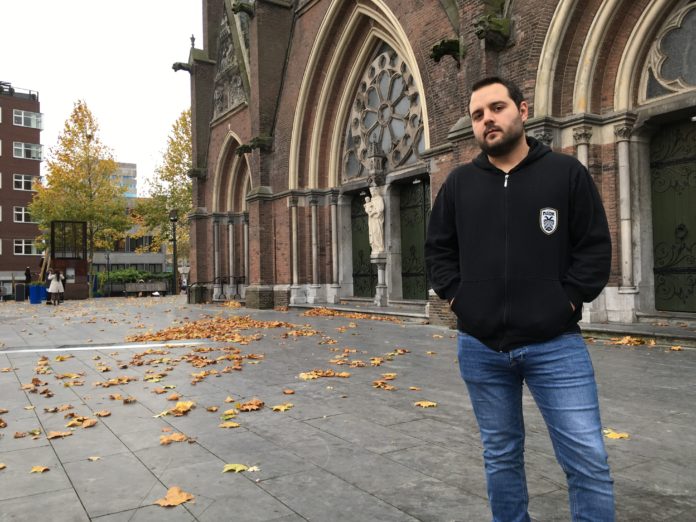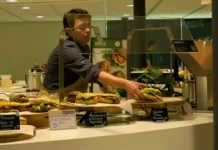The preview of the Europa League match of PSV against PAOK Saloniki generated several interesting reactions. This interview is a way of setting things straight.
One of the reactions on that specific article came from a Greek expat, Yannis Mantousis, who resides and works in Eindhoven. He felt that the word ‘infamous’ I used to describe the status of his beloved club was insulting and explained why and how. I wondered if he was proving their status of being hot-headed supporters to be correct, or whether I had drawn wrong conclusions?
As a journalist, I find it very important to look at things from different angles in order to come as close as possible to the truth. In this case, I wonder if what I read lead me to believe something that is untrue: isn’t PAOK Saloniki that infamous? Or is it much more than that? What better way to learn about this from a devoted supporter and hear what he has to say about it?
Hi Yannis, please introduce yourself to us.
Hi Joey, my name is Yannis Mantousis. I come from Thessaloniki, the second biggest city in Greece, which is located in the northern part of the country. I am 31 years old and I work as a Proto Engineer at the ASML EUV factory. I moved to Eindhoven in the autumn of 2016 and currently I live in De Bergen.
What study did you follow and how did you find this job?
I studied electrical engineering at a Technical University, back in Greece. I started working at ASML through an agency, and then directly to the company. I have to admit that I am very satisfied and happy with my job, and in general with the professional environment that I experience there.
What do you think of Eindhoven so far?
I think Eindhoven is a city that can offer a nice life to its citizens, by fulfilling all the practical needs that a young person has. For example, I believe that the balance between the cost of living and income for most of the young employees is quite satisfying, at least compared to my homeland.
What I miss in Eindhoven is culture. I believe that a big modern and multicultural city like Eindhoven should really invest more in the promotion of the local and foreign cultures, like cuisines, music etcetera.
Do you know of other Greeks who also live in Eindhoven?
Not many, actually. The Greek community isn’t really that strongly connected, and it’s very rare to have some common “Greek” events. Occasionally, I meet Greeks accidentally in bars or via common friends.
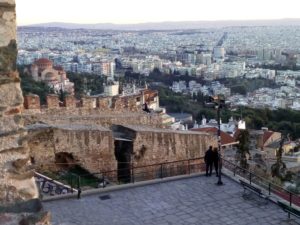
What do you miss about Greece?
Except for my close friends and my family, I don’t miss Greece so much, especially since I have the opportunity to visit her quite frequently. Maybe I can say that I really miss going to the local taverns with friends and enjoying traditional cuisine and drinks (Tsipouro), folk music and wide-ranged conversations; it’s a unique experience!
Can you paint us a picture of what the city of Thessaloniki is like?
Thessaloniki is a big harbour city, the urban area counts around 800.000 residents. It’s very historical, the initial establishment of the city took place back in 315 BC. It has many UNESCO monuments, Roman ruins and buildings, a Byzantine castle, walls and churches and Ottoman baths and mosques. The modern city is half neo-classical and half typically urban.
The Core business is the food and entertainment business; the city was ranked 9th globally on a recent National Geographic list about nightlife. Thessaloniki also has the best university city of Greece, with more than 100.000 students, and it’s famous for the extremely tasty oriental-inspired kitchen and the strong musical tradition. Rembetiko (Greek urban folk music) rocks!
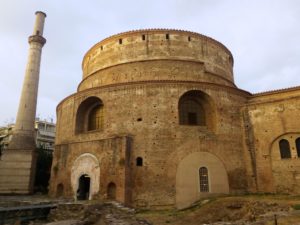
The difference with Athens is that Thessaloniki remains close to the traditional Eastern identity, instead of evolving into a modern European urban center. The Thessalonians as people are not that different from Athenians. One stereotype is that we are a more relaxed type of people. I think someone who loves variety and high quality tourist activities should definitely visit the city.
What kind of role does PAOK Saloniki have in the city?
It plays a massive part in the everyday life of Thessaloniki. When PAOK won the championship, the bigger part of the city was celebrating. When PAOK plays a match, the city is much more active, the enthusiasm spills even outside of the stadium in cafes and on the squares.
How did you become a PAOK supporter yourself?
Well, I first learned about PAOK from my father, who was a fan too. I started following PAOK through basketball – we used to have one of the best European teams, back in the 90s.
I think that I started really loving the football department of PAOK in the season of 2002/03, when a financially broken team, with unpaid players, won the Greek Cup after beating Olympiakos, AEK and eventually Aris in the final. In my young eyes, it all seemed pretty heroic: fighting against the odds and the obstacles was quite inspiring for me back then, as I was growing my own personality.
Tell us a bit more about the club’s history
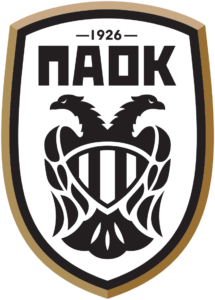
PAOK was founded in 1926, by the refugees who came from Istanbul. It was the club that would host the non-racist locals and the Greeks who were forced to immigrate from Turkey. Our stadium, Toumba, was built in 1959, the construction happened mainly in the evenings due to the fact that our fans at the time had day jobs. So in the evenings, they had the time to volunteer in the construction of the stadium.
The golden era, before the current decade, was in the 70s, when PAOK won its first trophies and expanded its fan base to the immigrant Greeks of Germany, the USA and Australia. When we won the double, there was a magnificent feast in the stadium, and after that, the fans were celebrating in the streets of the city. They were magical moments, impossible to forget.
What is typical for PAOK that no other Greek team has?
That’s a difficult question because for each fan his team is special. I will try to be objective and mention the fact that PAOK is one of the four most popular teams in Greece, even though they have not won many titles. For example: AEK Athens has more or less the same amount of fans as PAOK, but they have nearly a triple amount of titles.
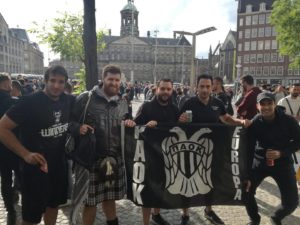
I think it’s true that PAOK fans generate more PAOK fans, and that’s something quite unique – at least to a certain extent. I even know a Scottish guy who became a fan of PAOK, because he visited Toumba once; this is how it works. When you visit Toumba, and especially the Ultras stand, you cannot escape from the PAOK-feeling.
Can you describe the rivalries between PAOK and other teams?
There are two true rivalries. The first one is between PAOK and Aris FC, the other big Thessalonian team. Aris was founded by native Greeks mainly, it represents the medium and higher classes of the city, and the rivalry started when PAOK was founded. It’s the derby of the city, something like between Celtic FC and Rangers Football Club in Glasgow, Scotland.
The second one is Olympiakos Piraeus. The rivalry ignited in the late 60s, when they tried to sign the attacking midfielder Yorgos Koudas, with help from the Greek dictatorship at the time. Eventually, he signed, but never played a game for Olympiakos, because the military regime was afraid of the possible reactions of PAOK fans, and finally he returned to PAOK, where he became the greatest player in our history.
Now the two clubs have the biggest fan bases in Southern and Northern Greece correspondingly, and that’s what keeps their rivalry alive.
What are your best memories as a supporter?
For sure the first cup final that I attended, against Aris in 2003, the qualification against Fenerbahçe SK in 2010 – because PAOK has roots in Istanbul – and obviously the double of 2018/19. In general, each game that I visited at Toumba, and the moments I shared with friends then, are remarkable experiences.
If you had to describe PAOK’s weak points, what would they be?
You now know that PAOK has refugee- and immigrant origins. Unfortunately, this tends to lead some PAOK fans to adopt nationalistic and anti-muslim/Turkish beliefs. This is something that I cannot tolerate: a fan of a refugee team to be racist.
Thankfully, the majority of PAOK fans have learned from the sufferings of their grandfathers. They know that human beings are all equal and that we should all live in peace, by accepting and supporting each other, no matter the differences in nationality, religion, culture and such.
The PAOK fanbase stems from low-class, hard-working people, so similar people from other nations and religions are very welcome.
In my article, I described your club as ‘infamous’ based on historical violence and issues with the chairman, about which I read in several articles and on Wikipedia. What is it that triggered you to react?
For starters, I thought that it was not too polite to call a whole club “Infamous” in the headline of an article, even if it has this reputation, because I think it reproduces a negative stereotype and hostility towards people like me. In any case, I think it was an unnecessary comment.
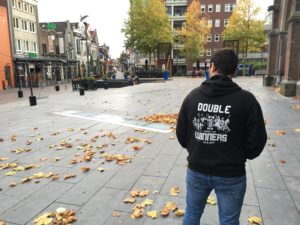
Secondly, I think that the problem of violence is not a problem that is unique for PAOK specifically. This is a general problem for clubs from Greece and the Balkans, and unfortunately, PAOK hasn’t managed to escape from it.
Additionally, football in Southeast Europe is completely corrupt, all the owners of the popular clubs have very dark side activities and many fans end up in hooliganism as a side-effect of extreme poverty. Unfortunately, PAOK’s situation is not an exception.
But many people might have this view of your club being infamous because PAOK has been in the news several times for riots and such.
The media also play a role in this. For example, we had a home match against Rapid Wien in 2012. The Austrian fans managed to bring fireworks into our stadium. Then they started throwing the fireworks towards the family stand, where children were watching the game, and the police did nothing initially. So the families were simply unprotected, and that’s when our die-hard fans decided to stop them. Still, I don’t justify the counter-violence of our fans, but it’s a detail that should be mentioned.
The next day you could read articles like “Riots in Toumba Stadium, PAOK fans become violent again” and such. We are not saints, but we are also not the devils that the media say we are. I guess no one calls Rapid Wien “infamous” now, right? We, PAOK, are just fans of a club with a civil majority and a ruffian minority when it comes to fan behaviour.
How do you think these problems can be solved?
I think football in every country tends to be a mirror of society. If we improve our societies, then football improves too. It’s a long way…
What do you believe every person should know about PAOK?
That, no matter the circumstances, PAOK as a club will always be a shelter for the persecuted: for the refugee, the immigrant, the poor, the junkie, for the outcast of a controversial society. That’s the fundamental value of this club, this is how its first fanbase was born; from the unification of the poor native and refugee Greeks. Even until today, it is quite common for people from refugee shelters – and especially children – to be invited to the academies, and even to meet the professional players in person.
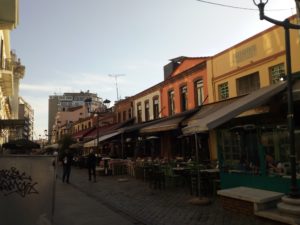
What do you expect from PAOK in the Greek Super League this season?
Well, we have a new coach, a great player from our past: Pablo Garcia. I hope he will be able to transfer his fighting spirit on to the players. I think we will compete for the championship, but I am not sure we will win it, because Olympiakos is also very strong. Personally I would love to proceed a lot further into the Europa League tournament; we need it as a club.
Do you follow Dutch football?
A bit. Obviously I support PSV, I live in Eindhoven. I appreciate the locals, so I want them to be happy – except when their team plays against PAOK, haha. Unfortunately, I haven’t been able to watch a match at the Philips Stadium. Hopefully I will manage to do so after the pandemic.
What do you know about PSV?
In Greece, we call the team just “Eindhoven”! When I came here, I learned that the club is actually called just “PSV”! In any case, it’s a historical European club. Great players have played here, such as Gullit, Romário, Ronaldo, Van Nistelrooy, Robben and so on.
What I like about PSV, is something that I like in general about Dutch football: the promotion of players from the youth academies. I think that’s a really important factor in order to have a healthy and competitive championship.
What did you expect of the match between PAOK and PSV on 5 November?
I was expecting a draw with many goals, something like 2-2 or 3-3. After the first half, I was impressed by the pressing of the PSV players! The game between the two was balanced. But if PSV had managed to maintain their fitness in the second half, I don’t see how PAOK could have avoided the defeat.
What do you think made the big difference in the second half?
I think it was a combination of occurrences from both sides that made the difference. I guess a motivational speech from our coach, and the substitutes that he made, combined with the natural tiredness that PSV players had, and the accurate finishing that PAOK achieved, were the key elements that gave us the opportunity to come back and eventually win.
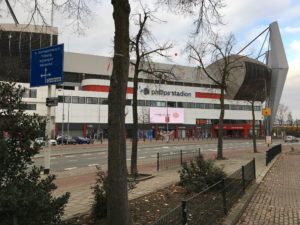
What do you expect for the match in Eindhoven on 26 November?
I think it’s going to be a completely different game. PSV has much quality in the attacking part, with great players like Donyell Malen, but PAOK has proved to be quite effective in counter-attacking. Both teams will probably be very careful and conservative, so I can see them cancelling each other out, with a draw as the final result. I hope PAOK and PSV will both go through to the next round.
Thank you very much for this interview. Is there anything else you want to share with our readers?
Keep loving the club you support, without hating others. We are all humans, only through friendship and respecting our differences we can go on. My roommate is an Olympiakos fan, so I can guarantee that it’s not that difficult to do it!
The Europa League re-match between PSV and PAOK takes place on Thursday 26 November. Kick-off at 21:00 (9 PM) at the Philips Stadium in Eindhoven. Join the conversation online at the PSV Eindhoven International Facebook Page.
Interview by Joey van der Hart for Eindhoven News.


